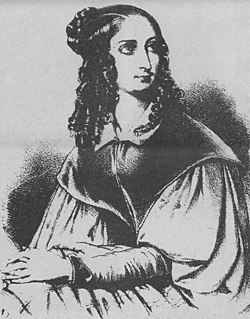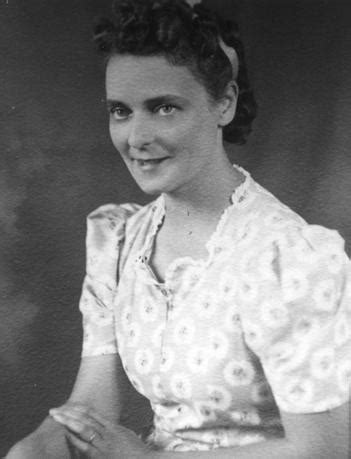A Quote by Isabel Allende
She was one of those people who was born for the greatness of a single love, for exaggerated hatred, for apocalyptic vengance, and for the most sublime forms of heroism but she was unable to shape her fate to the dimensions of her amorous vocation, so it was lived out as something flat and gray trapped between her mother's sickroom walls, wretched tenements, and the tortured confessions with which this large, opulent, hot-blooded woman made for maternity, abundance, action, and ardor- was consuming herself.
Quote Topics
Abundance
Action
Amorous
Apocalyptic
Ardor
Between
Born
Confessions
Consuming
Dimensions
Exaggerated
Fate
Flat
Forms
Gray
Greatness
Hatred
Her
Heroism
Herself
Hot
Large
Lived
Love
Made
Maternity
Most
Mother
Out
People
Shape
She
Single
Something
Sublime
Tenements
Those
Tortured
Trapped
Unable
Vocation
Walls
Which
Woman
Wretched
Related Quotes
In my earliest of years, my mother was a huge force in my life. She was for all intents and purposes, a single parent. My father had abandoned us. He was an alcoholic and a physical abuser. My mother lived through that tyranny and made her living as a domestic worker. She was uneducated but she brought high principles and decent values into our existence, and she set lofty goals for herself and for her children. We were forever inspired by her strength and by her resistance to racism and to fascism.
But will I always love her? Does my love for her reside in my head or my heart? The scientist in her believed that emotion resulted from complex limbic brain circuitry that was for her, at this very moment, trapped in the trenches of a battle in which there would be no survivors. The mother in her believed that the love she hadd for her daughter was safe from the mayhem in her mind, because it lived in her heart.
Yet there were times when he did love her with all the kindness she demanded, and how was she to know what were those times? Alone she raged against his cheerfulness and put herself at the mercy of her own love and longed to be free of it because it made her less than he and dependent on him. But how could she be free of chains she had put upon herself? Her soul was all tempest. The dreams she had once had of her life were dead. She was in prison in the house. And yet who was her jailer except herself?
I found her lying on her stomach, her hind legs stretched out straight, and her front feet folded back under her chest. She had laid her head on his grave. I saw the trail where she had dragged herself through the leaves. The way she lay there, I thought she was alive. I called her name. She made no movement. With the last ounce of strength in her body, she had dragged herself to the grave of Old Dan.
Her [Eleanor Roosevelt] father was the love of her life. Her father always made her feel wanted, made her feel loved, where her mother made her feel, you know, unloved, judged harshly, never up to par. And she was her father's favorite, and her mother's unfavorite. So her father was the man that she went to for comfort in her imaginings.
My mother didn't feel sorry for herself, she was left with no child support, no alimony at a very young age, with a child to raise, a high school education and she just figured it out. She didn't complain, she didn't rely upon government, she relied upon her own skill set, her own self confidence, her own drive in moxie and her own duty to me and her and she relied upon her family and her faith.
She realized how many of her beliefs were either unrealistic or belonged to her deceased parents and her ex-husband. She also realized that her expectations for herself and others were sometimes too rigid. She was trying to live up to what everyone else said was best for her, which made her depressed and hard to be around at times. Once she changed her beliefs about herself and others, she began to smile more and enjoy life.
She bent her finger and then straightened it. The mystery was in the instant before it moved, the dividing moment between not moving and moving, when her intention took effect. It was like a wave breaking. If she could only find herself at the crest, she thought, she might find the secret of herself, that part of her that was really in charge. She brought her forefinger closer to her face and stared at it, urging it to move. It remained still because she was pretending... . And when she did crook it finally, the action seemed to start in the finger itself, not in some part of her mind.
The woman who needs to create works of art is born with a kind of psychic tension in her which drives her unmercifully to find a way to balance, to make herself whole. Every human being has this need: in the artist it is mandatory. Unable to fulfill it, he goes mad. But when the artist is a woman she fulfills it at the expense of herself as a woman.
Virtue and vice suppose the freedom to choose between good and evil; but what can be the morals of a woman who is not even in possession of herself, who has nothing of her own, and who all her life has been trained to extricate herself from the arbitrary by ruse, from constraint by using her charms?... As long as she is subject to man's yoke or to prejudice, as long as she receives no professional education, as long as she is deprived of her civil rights, there can be no moral law for her!
Some attribute had departed from her, the permanence of which had been essential to keep her a woman. Such is frequently the fate, and such the stern development, of the feminine character and person, when the woman has encountered, and lived through, an experience of peculiar severity. If she be all tenderness, she will die. If she survive, the tenderness will either be crushed out of her, or—and the outward semblance is the same—crushed so deeply into her heart that it can never show itself more.
My mother has made choices in her life, as we all must, and she is at peace with them. I can see her peace. She did not cop out on herself. The benefits of her choices are massive-a long, stable marriage to a man she still calls her best friend; a family that has extended now into grandchildren who adore her; a certainty in her own strength. Maybe some things were sacrificed, and my dad made his sacrifices, too-but who amongst us lives without sacrifice?
In 1971, Bossier City, Louisiana, there was a teenage girl who was pregnant with her second child. She was a high school dropout and a single mom, but somehow she managed to make a better life for herself and her children. She encouraged her kids to be creative, to work hard and to do something special. That girl is my mother and she's here tonight. And I just want to say, I love you, Mom. Thank you for teaching me to dream.
Not that she didn't enjoy the holidays: but she always felt-and it was, perhaps, the measure of her peculiar happiness-a little relieved when they were over. Her normal life pleased her so well that she was half afraid to step out of its frame in case one day she should find herself unable to get back.






































